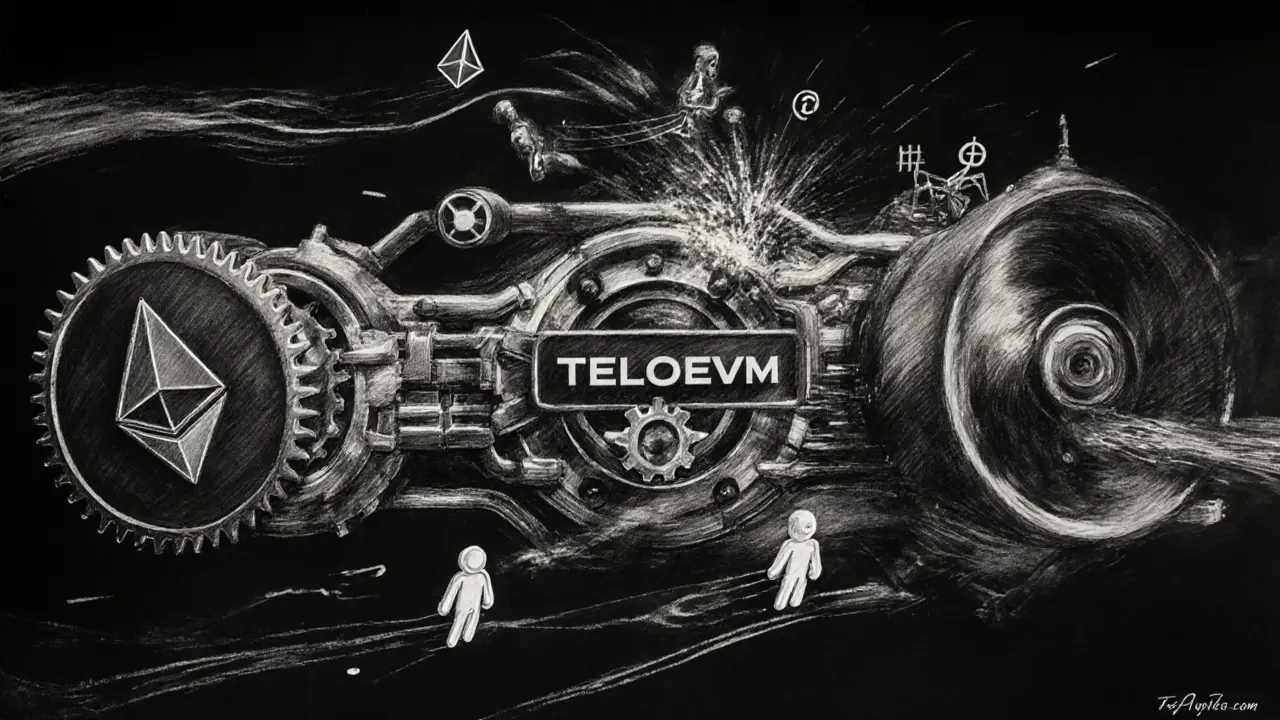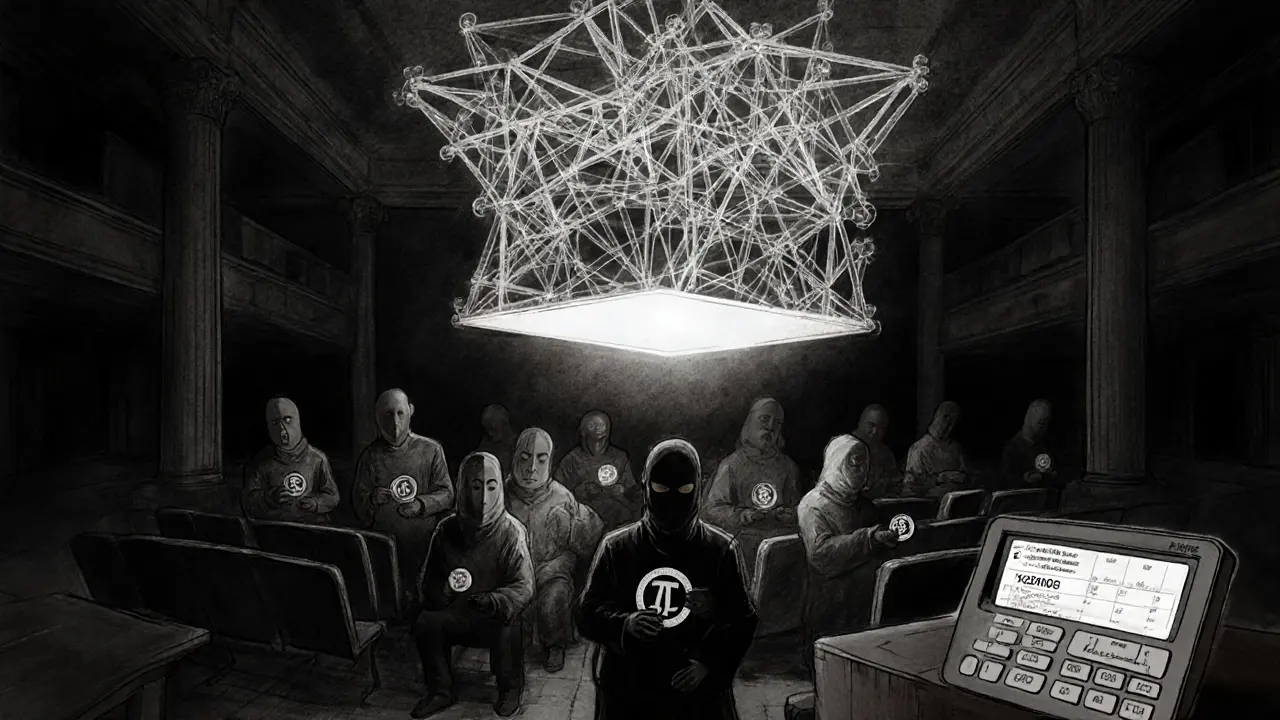Telos (TLOS) Token Value Calculator
Your Investment Summary
Token Amount: 0 TLOS
Price Range: -
Minimum Value: $0.00
Maximum Value: $0.00
Current TLOS Token Metrics
Max Supply: 420 million
Current Supply: 52.4 million
Circulating Supply: 442.7 million
Market Cap: $21.2 million
24h Volume: $4,600
All-Time High: $0.6224
TelosEVM Performance Comparison
| Metric | Telos | Ethereum | Solana |
|---|---|---|---|
| TPS (On-chain) | ~15,200 | ~15 | ~65,000 |
| Avg. Gas Cost | ≈ $0.0003 | ≈ $10-$30 | ≈ $0.0005 |
| Consensus | Telos Zero (DPoS-BFT) | PoS (Ethereum 2.0) | PoH + PoS |
If you’ve seen headlines about Telos cryptocurrency, you’re probably wondering what it actually does, why its speed matters, and whether the token is worth watching.
Quick Summary
- Telos launched in 2018 with a community‑driven, fair token distribution.
- Its native token, TLOS, powers governance, staking, and transaction fees.
- TelosEVM can process >15,200tps, making it the world’s fastest Ethereum‑compatible virtual machine.
- Zero‑knowledge (zk) tech and the upcoming SNARKtor zkEVM layer add privacy and scalability.
- Governance is run by token‑holder votes through the Telos Decide engine.
What Is Telos?
When people talk about Telos is a high‑speed blockchain platform that supports decentralized applications (dApps) and smart contracts, they usually highlight three pillars: speed, community governance, and data protection.
Telos started on October12018 as a “fair launch” project-no ICO, no venture‑capital seed, just a transparent token‑distribution method that let early participants earn TLOS by contributing computational resources.
The mainnet went live in December2018, and the ecosystem has since added a dedicated Ethereum Virtual Machine (TelosEVM), a native consensus layer (Telos Zero), and a suite of privacy tools built on Zero Knowledge proofs.
Tokenomics at a Glance
The TLOS token fuels every action on the network. Below are the key figures as of October2025:
- Maximum supply: 420million TLOS
- Current total supply: 52.4million TLOS (locked for staking and governance)
- Circulating supply: 442.7million TLOS
- Market price: roughly $0.048‑$0.05 per token
- 24‑hour volume: about $4,600
- Market cap: $21.2million (fully diluted: $2.52billion)
- All‑time high: $0.6224 (Feb2024)
- All‑time low: $0.02799 (Jul2025)
Staking rewards, governance participation, and transaction fee discounts are the primary utilities for TLOS holders. The token’s modest price volatility in 2025 has sparked debate among traders, but the underlying network usage continues to grow.
Why Speed Matters: TelosEVM
TelosEVM, introduced in late2021, is the world’s fastest Ethereum‑compatible virtual machine. It can process more than 15,200 transactions per second (tps), dwarfed only by specialized layer‑2 solutions.
Because it speaks the same Solidity language as Ethereum, developers can port existing dApps without rewriting code. The speed advantage lowers gas costs dramatically-most transactions settle for fractions of a cent, compared with $10‑$30 on the Ethereum mainnet at peak times.
Typical use‑cases that benefit from TelosEVM include high‑frequency DeFi swaps, NFT minting bursts, and real‑time gaming actions where milliseconds count.

Zero Knowledge & the Upcoming zkEVM Layer
Privacy and scalability are often at odds. Telos tackles both with Zero Knowledge (ZK) technology. The platform’s ZK engine lets participants prove that a transaction follows the rules without revealing the underlying data.
Telos’s next big upgrade is the hardware‑accelerated zkEVM layer, powered by SNARKtor - a protocol for recursive proof aggregation. When SNARKtor launches on testnet, it will enable massive proof‑batching, meaning thousands of private transactions can be bundled into a single on‑chain proof.
Potential applications range from confidential voting systems to private DeFi lending that hides borrower balances while still guaranteeing solvency.
Governance by the People: Telos Decide
Unlike many blockchains where a core team decides tokenomics, Telos puts power in the hands of TLOS holders through the Telos Decide Governance Engine. Token holders can propose and vote on protocol upgrades, fee adjustments, and even community grants.
The system is underpinned by a transparent arbitration contract called the Dispute Arbitration Smart Contract (DASC). When a dispute arises, DASC collects evidence, lets arbitrators evaluate it, and issues a judgment based on the Telos Constitution.
This blend of on‑chain voting and off‑chain arbitration aims to avoid the governance dead‑locks that have plagued projects like Ethereum Classic or EOS.
Ecosystem Snapshot
Telos hosts more than 100 live dApps, covering NFT marketplaces, DeFi protocols, and GameFi projects. The developer community exceeds 1,000 contributors worldwide, and over 200 organizational partners are actively building on the network.
Key ecosystem highlights:
- NFT platforms: MintableArt, TelosGallery - low‑cost minting thanks to cheap gas.
- DeFi: TelosSwap (AMM), StableBridge (cross‑chain stablecoin gateway).
- GameFi: CryptoQuest - a play‑to‑earn RPG that leverages TelosEVM’s speed for real‑time battles.
Retail adoption is evident: roughly one million active wallets connect to Telos daily, driven by the low entry cost for both developers and users.
How Telos Stacks Up Against Competitors
| Metric | Telos | Ethereum | Solana |
|---|---|---|---|
| Consensus | Telos Zero (DPoS‑BFT) | Proof‑of‑Stake (Ethereum 2.0) | Proof‑of‑History + PoS |
| tps (on‑chain) | ~15,200 (TelosEVM) | ~15 (Ethereum Mainnet) | ~65,000 (Solana) |
| Avg. Gas Cost | ≈ $0.0003 | ≈ $10‑$30 | ≈ $0.0005 |
| Governance Model | Token‑holder voting (Telos Decide) | EIP process + on‑chain voting | Validator council |
| Privacy Feature | Zero Knowledge proofs + upcoming zkEVM | zk‑Rollups (layer‑2) | Limited native privacy |
Telos’s sweet spot is a blend of Ethereum compatibility, ultra‑low fees, and a community‑first governance model. It may not hit Solana’s raw throughput, but its EVM compatibility makes onboarding far easier for existing developers.
Future Roadmap & Price Outlook
Short‑term (2025): The SNARKtor testnet is already live, and the mainnet zkEVM launch is slated for Q4 2025. Analysts predict the TLOS price will hover between $0.052 and $0.057, with an average around $0.0545.
Mid‑term (2026‑2028): As more privacy‑focused dApps migrate, staking rewards could increase network security, potentially nudging the token upward. Some forecasts peg a 2028 price near $0.12.
Long‑term (2030): With the “Ultra Sound Money” initiative and broader adoption of zk‑technology, optimistic models see TLOS averaging $0.37‑$0.41, a ten‑fold rise from today.
Remember, crypto prices are volatile. The technical fundamentals (speed, governance, zk‑privacy) are what give Telos staying power, not short‑term market swings.

Frequently Asked Questions
What makes Telos different from other blockchains?
Telos combines Ethereum compatibility with the world’s fastest EVM, a community‑driven governance engine, and built‑in Zero Knowledge privacy tools. Its fair launch and low transaction fees also set it apart.
How can I buy TLOS?
TLOS is listed on most major exchanges. Create an account, complete KYC if required, and place a market or limit order for TLOS. Transfer the tokens to a Telos‑compatible wallet (e.g., Telos Wallet, Scatter) to start staking or voting.
Do I need to stake TLOS to use the network?
Staking isn’t mandatory for regular transactions, but staking earns you block‑producer rewards and voting power in Telos Decide. Many holders stake a portion of their balance to participate in governance.
What is SNARKtor and why should I care?
SNARKtor is Telos’s protocol for aggregating recursive Zero Knowledge proofs. It enables massive scaling of private transactions, meaning you can hide data without sacrificing speed. The upcoming zkEVM layer built on SNARKtor will bring this privacy to mainstream dApps.
How does the Telos Decide governance process work?
Token holders submit proposals on the Telos Decide portal. Once a proposal reaches a quorum, TLOS‑staked voters cast yes/no votes. If approved, the change is executed automatically by smart contracts. Disputes are resolved by the DASC arbitration system.


Telos is just another hype coin, nothing special.
The article presents a comprehensive overview of the Telos blockchain, emphasizing its performance characteristics and tokenomics. It correctly identifies the TelosEVM as one of the fastest Ethereum‑compatible virtual machines currently available. The reported throughput of approximately fifteen thousand transactions per second surpasses many established platforms and justifies the claim of ultra‑low latency. Moreover, the discussion of the Telos Zero consensus mechanism provides valuable insight into how delegated proof‑of‑stake and Byzantine fault tolerance are combined to achieve finality. The tokenomics section accurately details the maximum supply of four hundred twenty million TLOS and the current circulating figures. The distinction between total supply and circulating supply is particularly pertinent for market‑cap calculations. The inclusion of the all‑time high price of $0.6224 offers a benchmark for historical performance. The article further outlines the governance model, highlighting the Telos Decide engine and the role of token‑holder voting. This description aligns with the protocol’s stated commitment to community‑driven decision‑making. The privacy roadmap, featuring the SNARKtor zkEVM layer, is presented with sufficient technical depth. The expected impact of recursive zero‑knowledge proofs on scalability is correctly projected. The comparison table juxtaposing Telos with Ethereum and Solana succinctly illustrates relative strengths in transaction speed and gas costs. The volatility disclaimer appropriately reminds readers of the inherent risks in cryptocurrency investments. The future outlook sections provide plausible price ranges based on short‑term, mid‑term, and long‑term projections. Overall, the piece maintains a neutral tone while delivering substantive technical information suitable for both newcomers and seasoned practitioners. Readers seeking a concise yet thorough briefing on Telos will find the article valuable.
Honestly, I think they’re overselling the speed; most dApps don’t need that many TPS.
I gotta say, the gass fees on Telos are insanely low-like pennies-in contrast to Ethereum’s tens of dollars.
Telos’s ultra‑low fees make it easy for newcomers to experiment, and the community‑driven governance means anyone can have a say, which is pretty cool.
When one examines the architecture of Telos, one observes a confluence of delegated proof‑of‑stake, Byzantine fault tolerance, and a commitment to decentralization; this triad, while complex, embodies a philosophical stance that values both speed and security, and it invites contemplation about the future of blockchain consensus mechanisms, urging scholars and developers alike to reconsider traditional trade‑offs.
Indeed, the comparative table succinctly captures Telos’s advantages; however, it is essential to acknowledge the ongoing development of zk‑EVM, which may further enhance privacy, and thus, the ecosystem’s evolution should be monitored with diligence.
Sure, another “fast blockchain” that will change everything-yeah right.
Oh, so now we’re supposed to believe that Telos is the savior of crypto? Please, the hype train is already full.
While the presentation extols the virtues of Telos’s throughput, one must critically assess whether such performance translates into real‑world utility, given that many applications prioritize security and composability over sheer transaction volume.
Think about it: speed without purpose is just noise, and Telos’s real promise lies in balancing rapid execution with meaningful governance.
Great summary! 👍 Keep it up.
Telos should stay focused on serving its community, not chasing hype.
The protocol’s implementation of a hybrid DPoS‑BFT consensus algorithm, coupled with recursive zk‑SNARK aggregation, provides a layered scalability paradigm that is poised to mitigate throughput bottlenecks while preserving cryptographic integrity.
Love the enthusiasm! Remember, consistent staking and community participation are key to long‑term success 🚀.
From a developer’s perspective, the combination of near‑zero gas fees and EVM compatibility is nothing short of revolutionary; it opens doors to innovative dApps that were previously constrained by cost, and the upcoming privacy layer promises to safeguard user data without sacrificing performance.
We need more projects like Telos that put the people first and refuse to bow to centralized crypto giants.
The so‑called “community‑driven” model is just a facade; power remains concentrated among a handful of block producers.
It’s exciting to see how Telos is gaining traction; I’m optimistic about its future growth.
Curious about the SNARKtor testnet results-anyone seeing latency improvements? 🤔🚀
Telos is an interesting mix of tech and community vibes.